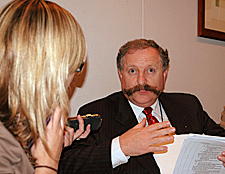 Sunday school teachers and all other voluntary lay church workers face the prospect of being stood down if they are found to be engaged in wrongful conduct, according to new draft measures unveiled to the Sydney Synod last night.
Sunday school teachers and all other voluntary lay church workers face the prospect of being stood down if they are found to be engaged in wrongful conduct, according to new draft measures unveiled to the Sydney Synod last night.
“This ordinance is about refining and improving the existing law”, Director of Professional Standards Philip Gerber told the Synod.
“I see signs we are making some progress. There are two systems for clergy and laity - we are trying to bring them into one. We need to have a robust debate about lay people’s expectations.”
Habitual drunkenness, unchastity, failure to pay just debts, wilful neglect of ministry and a conviction resulting in a prison sentence of 12 months or more have long been charges that could be brought before the clergy.
Under the proposals, the same standards will also apply to lay people holding office in their parish, including Sunday School teachers, church wardens, parish councillors and Bible study and youth group leaders.
If a lay worker is the subject of a complaint and is alleged to have breached a standard, they will be investigated and brought before a Professional Standards Committee.
The Discipline Ordinance 2005 responds to tough measures implemented by the Synod over the past 10 years aimed at preventing abuse and misconduct in the Church.
The ordinance aims to repeal the ordinance drafted in 2002.
The measures will not apply to employees of Anglican Retirement Villages, Anglicare or Anglican Schools.
An option of conciliation in the ordinance will avoid a costly litigation process and the "painful experience of Diocesan Tribunals', says Mr Gerber.
In response to a question from the Rev John Cornish of Epping, who asked how the costs of a tribunal will be met, the Synod heard that a recent case involving a member of the clergy brought before the Diocesan Tribunal has led to the proposal to cap the legal costing available to clergy.
In recent years the Diocese's Professional Standards Unit (PSU) has applied rigorous screening and selection procedures to clergy and paid church workers along with providing ongoing training and support.
"We want to get this right," says PSU Director Philip Gerber. "The reality is, it's our problem. These are issues we have to deal with."
The committee that drafted the ordinance has yet to clarify the definition of a "church worker', Mr Gerber said.
Sydney Diocese is the first of Australia's 23 Anglican dioceses to propose the measures.
They come on the back of a raft of tough new measures across the Australia Anglican Church aimed at tightening codes of conduct and protection for abuse victims.
The matter will be debated again in 12 months allowing time for submissions about the ordinance to be made before March 31, 2006.
"The whole issue of child abuse and the failure of the church to deal with this appropriately over the decades is a factor in victims having a blockage to consider the gospel," Mr Gerber said.
"They feel they have had their faith stolen from them."



























